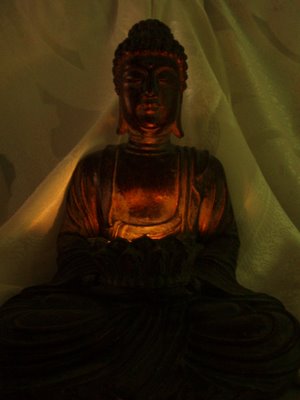Contemplating Carl Jung on Neurotic Suffering
Confined to my bed, trying to be a 'good girl' and do as the doctor said, as I have been urged to do by so many, I decided to pick up one of the many unfinished books at my beside and read between naps.

Which is how it is that I was reading Carl Jung's theories about suffering, about the transformational power of true suffering, and the tendancy of people to manufacture useless suffering. He referred to it as a form of childish neurosis, the redundant, compulsive clinging to self-doubt, drama, worry, and anxiety as a replacement for honest confrontation with the deeper anguish that the transience, uncertainty, and loss present in our lives generates. An anguish which awakens us to the signficance of our lives, which shows us the depths of our courage and the inner resources we did not know we had.
In the face of pain and difficulty and loss, we feel overwhelmed, uncertain, adrift. We need to make sense of this pain in some way, to find the resources within ourselves to move beyond it, to find in it an opportunity to grow, to develop our strengths. Many rise to the occurance of suffering in their lives... some do not. Many move on to the next challenge in their lives... and some do not. Some of us cling to the familiar sufferings, never getting past them. But why? Because it is a way of exerting control over our lives. We know, whether consciously or not, that life is suffering, and deeply fearful of our abilities to handle the pain that will come our way, we cling to what we know. Confronted with the familiar, we are secure in our ability to survive it.
But doing this, living this way, caught in a cycle of familiar sufferings, we remain little more than children. Neurotic children, feeling helpless as we continually repeat the same mistakes, suffer the same setbacks--even as something in us demands that things change, fit into out fantasy fairytale visions of how things should be, enabling us to avoid responsibility for our thoughts, attitudes, and actions, laying the blame at the feet of anyone other than ourselves--our parents, our gods, our societies.
And in doing so some never learn the lesson that while pain and loss and uncertainty are inevitable, suffering is not. Suffering is not. Suffering is subjective, it is generated by our psychological responses to our experiences, and thus, it is possible to alleviate suffering, to transform it, to turn it into something transformational and transcendant.
Sometime in the past two years I've come to understand this consciously. Of course, there is often a gap between understanding a thing and acting upon it, and even when acting upon it, there is the necessity of practicing a thing, of becoming proficient at it. I am still bridging that gap, still struggling to leave behind the childish and neurotic clinging to idealistic expectations that create dissatisfaction with the now.
And the now, the present, this moment--is what I have--and it is by far the most powerful, charged moment of my life.
 Conscious of all this, I am carefully evaluating how well I am leaving the neurotic child behind, and how often she rears her golden-blonde head. I love that child, I have embraced her, but her coping mechanisms are out-dated. I must take care not to cling to the familiar sufferings. I've no need to live in a perpetual state of crisis. It is ok to be content, to be at peace, to live in and experience the beauty of life as it happens, free of fearful expectations.
Conscious of all this, I am carefully evaluating how well I am leaving the neurotic child behind, and how often she rears her golden-blonde head. I love that child, I have embraced her, but her coping mechanisms are out-dated. I must take care not to cling to the familiar sufferings. I've no need to live in a perpetual state of crisis. It is ok to be content, to be at peace, to live in and experience the beauty of life as it happens, free of fearful expectations.Labels: audio, essay, podcast, suffering, uncertainty

























